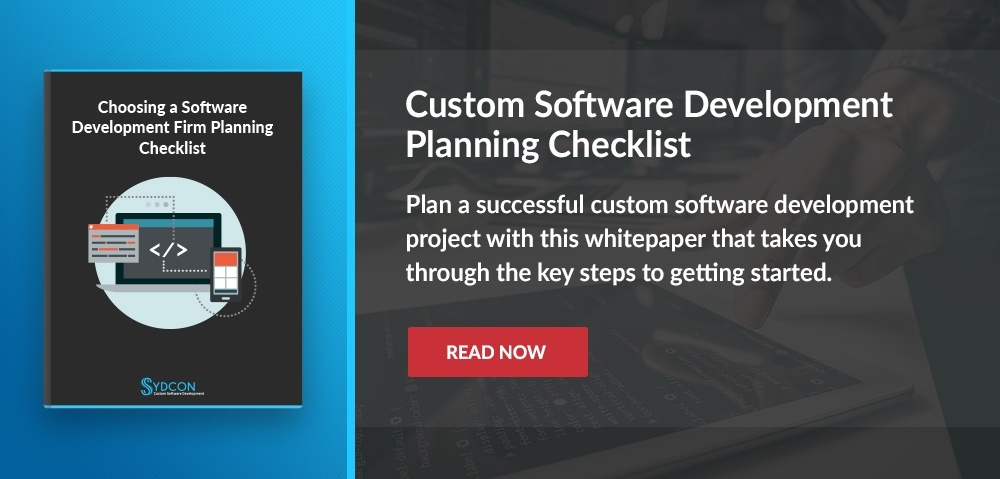

Custom software is increasingly popular among enterprises for its flexibility, scalability, and reduced cost. Whether you’ve already decided that custom software is the right path forward or you’ve just started your research, this guide will tell you everything you need to know.
What is Custom Enterprise Software?
As the name suggests, enterprise software is intended to help organizations execute and fulfill their business processes. Enterprise software can address issues ranging from human resources and finance to project management and customer relationship management.
Custom enterprise software is software that is developed for the needs and objectives of relatively few business users, rather than being made available on the shelf for general public consumption.
Planning a custom software project? Our planning checklist takes you through the key steps to set your project up for success.
Organizations rely on custom enterprise software for a variety of reasons (which we’ll discuss during the next section). In many cases, your business needs may be so unique that the only way to meet them is to develop a custom solution. Even if you do find a pre-built solution that matches your requirements, the price of software licenses for all the users in your organization can be prohibitively expensive.
The main difference between custom enterprise software and pre-built business software is that custom software has to be brought into existence. Because custom software is intended to meet specific or unique needs, it’s typically much more complex than a pre-built solution, with more moving pieces. It’s also easier to integrate and loop in with other software and data sources.
The Value of Software Automation for Enterprises
Custom automation software, in particular, can be a key differentiator for your business that helps you better serve your customers and beat your competitors. The advantages of software automation include:
- Saving time: Automating your business processes saves time by speeding up slow, repetitive, manual processes. Robotic software agents can work overtime 24 hours a day to help you become more productive and get the insights you need.
- Reducing errors: The old saying “To err is human” is particularly true when it comes to data entry and other laborious manual processes. The fewer human employees who are involved in a process, the less likely it is that errors will be introduced along the way.
- Increasing transparency: By formally defining your business processes, automation gives you a more transparent look into how your company operates. This is particularly important when you’re facing an audit or need to remain compliant with laws such as HIPAA or Sarbanes-Oxley.
- Boosting ROI: By cutting expenses while raising accuracy, automation improves your ROI on both ends. According to consulting firm McKinsey & Company, the return on investment of robotic process automation can be anywhere from 30 to 200 percent in the first year alone.
- Making customers happier: Moving toward automation can majorly improve customer outcomes. For example, you can use automated chatbots in the first stage of your customer service pipeline to understand users’ issues and direct them to the appropriate agent or department.
Why Go Custom for Enterprise Software?
Businesses who decide on custom software instead of an off-the-shelf solution usually cite one or more of the reasons below:
- Customization: Packaged software solutions are almost always “one-size-fits-all.” Custom software lets you easily pick and choose exactly the features you require to run your business.
- No unnecessary features: With custom-built applications, there’s no need to pay for features that you don’t want or need, which results in software bloat. The application fits your business perfectly, making it easier for employees to start learning and using it.
- Scalability: As your business grows and evolves, you’ll undoubtedly want to add new features or make changes to existing ones. You can work with your development partner (or even find a new one to work with) to adapt the software based on these new requirements.
- Reporting and integrations: Your workflow and tech stack are unique to your organization, which can create problems when using pre-built software. On the other hand, you can design custom software to include any custom reporting requirements that you have, or perform custom integrations with the software and data sources that you’re already using.
- Cost: If you prefer capital expenditures to operating expenditures, custom software is the way to go. You’ll have full ownership of the code in most cases, so there’s no need to pay the pricey licensing fees of pre-built software.
How Much Does Custom Enterprise Software Cost?
There are custom enterprise software options to meet every budget, from the austere to the ostentatious. However, one big difference between custom and packaged software is the pricing model.
With custom software, you’ll usually pay a one-time capital expense to the developer who’s responsible for building it. Pre-built business software, on the other hand, typically charges recurring monthly or annual license fees for each user. This can be more expensive in the long run, depending on the length of time for which you plan to use the software.
Another point of distinction is that you don’t necessarily have to pay for the entire custom software application upfront. If you’re not rushing to meet a deadline, you can spread the development out in phases, rolling it out one piece at a time. Because you have total ownership over the code base, you can also add features to custom software later if your business requirements change.
Third, the price of pre-built software is almost always “fixed” and non-negotiable. Meanwhile, going the custom route allows you to shop around and compare prices. Qualified, experienced development partners can work with you on the “discovery” process, where they’ll help you understand your goals and which software features and functionality you need to attain them. They’ll then give you a quote that you can accept or take to another development firm.
In short, custom software is typically much more flexible in terms of pricing than the pre-built alternatives.
What is the ROI of Custom Enterprise Software?
- Reducing errors: Typos in spreadsheets have led to some costly mistakes, such as the error that cost Canadian power company TransAlta $24 million. Removing humans from the equation means that your processes will become much more accurate, saving money as a result.
- Improving reporting: Custom reports enable you to get a quick glance at the big picture, without having to gather data from several different sources. This both saves you time and can help reveal important insights that you would have otherwise overlooked.
- Streamlining processes: You can use custom software for a variety of purposes: improving sales processes, keeping better track of your inventory, recording employee performance, and more. This enables your organization to be more profitable in the long run.
- Repurposing employees: Processes that are heavily dependent on repetitive manual activities such as data entry are a waste of time for your human employees. By letting software handle these tasks, you can let your staff focus on higher-level strategic activities that will reap more benefits for your business in the long term.
Final Thoughts
While some companies may still prefer the convenience of a packaged solution, custom enterprise software can provide your business real, substantial benefits in the long run. Interested in learning what custom enterprise software can do for you? Speak with an experienced, professional development firm who can help advise you on the best path forward.



